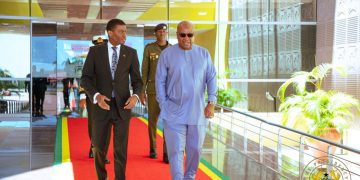Governor Dr. Asiama Calls for Strategic Shift in U.S.–Africa Trade at Washington Forum
The Governor of the Bank of Ghana, Dr. Johnson Pandit Asiama, has called for a redefinition of U.S.–Africa trade relations, urging both sides to shift from transactional engagement to transformative economic partnerships grounded in value addition, innovation, and strategic co-creation.
Speaking at the Africa Leadership & Partners Forum held at the Ghana Embassy in Washington, D.C., Dr. Asiama delivered the keynote under the theme “Africa and the U.S.: Shaping a Trade-Driven Future.”
“Africa must no longer be seen as a warehouse of raw materials,” said Dr. Asiama. “We are ready to co-create the next chapter of global trade, where American innovation meets African ingenuity.”
At the heart of Dr Asiama’s appeal was the African Growth and Opportunity Act (AGOA), the U.S. legislative framework that has shaped trade with eligible African countries since 2000. With AGOA set to expire in 2025, calls for reform are gaining urgency. Dr. Asiama contended that its renewal must reflect the continent’s transition from raw commodity dependence to value-added production.
He proposed reforms that include incentivising joint ventures between African and American firms; simplifying compliance for small exporters; and expanding AGOA’s scope to include digital trade and e-commerce.
The Governor of the BoG cited Ghana’s bilateral trade with the U.S., averaging $2.5 billion annually, as both a case study in success and a reflection of Africa’s broader challenges. In 2024, Ghana’s exports to the U.S. stood at $1.6 billion, comprising mainly crude oil, cocoa, and timber, while imports totalled $874 million, yielding a trade surplus of over $730 million.
Success stories such as Kosmos Energy’s oil discovery, Newmont Mining’s job creation, and Niche Cocoa’s expansion into Wisconsin were highlighted as exemplars of strategic trade relationships that transcend traditional extractive paradigms.
However, Dr Asiama cautioned that without accelerating structural transformation, even Ghana’s progress remains vulnerable. “The stories behind the trade show us why deeper partnership matters,” he noted.
He therefore outlined a four-pillar strategy to underpin the next phase of Africa–U.S. trade relations:
- Macroeconomic Credibility and Strategic Autonomy: Stabilising inflation, rebuilding reserves, and ensuring central bank independence are foundations for investor confidence.
- Financial System Resilience and Risk Mitigation: Leveraging post-pandemic instruments such as Ghana’s Financial Stability Fund, while calling for broader adoption of supervisory technology (Suptech) and regulatory technology (Regtech).
- Trade Integration and Financing: Emphasising investment opportunities in agro-processing, logistics, energy infrastructure, and 24-hour manufacturing zones. Asiama urged the establishment of S.–Africa Trade Finance Hubs to de-risk transactions and mobilise capital.
- Inclusive Digital Transformation: Pointing to Ghana’s eCedi pilot as a digital infrastructure model, he advocated integration of U.S. initiatives like the $350 million Digital Transformation with Africa (DTA) with African national strategies, particularly in cybersecurity, cross-border payments, and digital identity.
“Africa’s future must be digital—but inclusive,” he said. “This is not just a tech agenda; it is a development imperative.”
Dr. Asiama’s address concluded with a pointed call for U.S. policymakers to align trade engagement with Africa’s evolving economic architecture. Beyond AGOA reform, he advocated for expanded investment by institutions such as the U.S. International Development Finance Corporation (DFC) and EXIM Bank in African infrastructure and trade finance.
He also called for collaboration on clean energy and digital trade, noting that Africa’s green and tech transitions are unfolding rapidly and require supportive international frameworks.
“Let us shape a future where Africa and the U.S. are not just trading partners but co-creators of prosperity,” Dr Asiama said, adding, “Where American innovation meets African ingenuity.”
Held under the auspices of the EBII Group and the Ghanaian Embassy in Washington, the forum brought together policymakers, investors, and institutional leaders from across Africa and the U.S. It comes at a time when geopolitical realignments and supply chain disruptions are prompting countries to reassess trade dependencies and regional alliances.
For Ghana and Africa more broadly, Dr. Asiama’s remarks signal a recalibration of expectations: one in which the continent no longer seeks entry but equal stakes in shaping global trade.
As global alliances shift and economic nationalism rises, the question, according to Asiama, is not whether Africa will trade but how it will define its value in a reimagined world economy.








